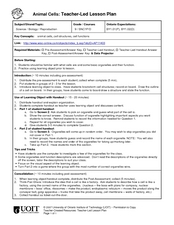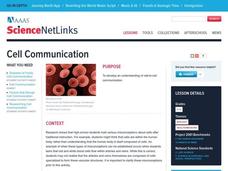Curated OER
Animal Cells
Students define the function of the different parts of a cell. In this biology lesson, students discuss cell structures and how its organelles perform basic functions. They differentiate between human and animal cells.
Curated OER
Parts of a Cell Analogy
Middle schoolers reinforce comprehension of the parts of a cell. Theyl synthesize this content knowledge in a descriptive paragraph writing assignment.
Curated OER
Cell Division
High schoolers describe the cell cycle. They make a connection between DNA replication and cell division. Students describe the parts of the cell that participate in cell division and the steps of cell division.
Virginia Department of Education
Cell Parts
What do a bird, an egg, a rabbit, and a toad all have in common? This fun-filled resource explains the similarities and differences between cells and how all cells are similar, yet all are different. Learners begin by depicting a...
Curated OER
Cell Communication
Students clarify common misconceptions about cells. They assess initial knowledge of cells and cell behavior, read and discuss an article and consider the role of cell communication in the diseases of diabetes, multiple sclerosis and...
Curated OER
All's Well for Stem Cells
By exploring the latest research on cell and tissue renewal your young scientists can understand the various internal body parts and systems examined in these studies.
Science 4 Inquiry
Eukaryotic Cells: The Factories of Life
Eukaryotes include humans, animals, and plants. Scholars learn about the parts of eukaryotic cells. They design models of a store and match the correct function of each part to the function of a part of the cell. They review their...
Curated OER
Solar Kit Lesson #3 Parts of a Solar Panel - Part I
A solar cell is similar to a rechargeable battery in many ways. Science lab groups connect each in a series circuit to run a mini motor and then compare and contrast them by answering questions and completing a Venn diagram. This is an...
Baylor College
Magnifying and Observing Cells
Though it isn't a novel activity to prepare onion cell and Elodea plant cell slides as examples of cells in a microbiology unit, this resource will leave you thoroughly prepared. As pupils examine the slides that they prepare, they draw...
Curated OER
Cell Size and Shape; Diffusion and Osmosis Processes
Use salmon eggs as a cell model for demonstrating the movement of water over concentration gradients. Junior scientists examine the same process microscopically with an onion cell. They use a thistle tube and a semipermeable membrane to...
Curated OER
Cell Structures and Their Functions
Life science learners investigate live cells. They examine wet mount slides of cyanobacteria and Elodea plants. They peer into the dynamic microscopic world of protists. Afterward, they construct a model of a cell, including rudimentary...
Curated OER
Cell Parts
Students identify parts of a cell. In this biology instructional activity, students create a simulated cell by using Jell-o, fruit roll ups, raisins, gum drops, and M&M's. Students construct the simulated cell and identify each part.
Towson University
Mystery of the Crooked Cell
Can your class solve the Mystery of the Crooked Cell? Junior geneticists collaborate to learn about sickle cell anemia in a fascinating lesson plan. The included materials help them to examine the genetic factors behind the disease...
Curated OER
Construction of a Microscale Fuel Cell
Fuel cells are being called the "energy source" of the future. Allow your high school chemistry class to construct a miscroscale fuel cell, complete with all components to generate energy. This engaging activity will allow them to apply...
Curated OER
Plant and Animal Cells
Students investigate parts of a cell. In this plant cell lesson, students determine the difference between plant and animal cells. Students discover that coral is an animal based on cell characteristics. Students create puppets to...
Curated OER
The Physics of Cell Phones
Students explain how cell phones work. In this physics lesson, students describe the advantages and advantages of having one. They identify the different parts of a cell phone.
Curated OER
Cell Analogies!
Liken a cell and its organelles to a tiny person and its organs. After gathering information on cell structures and their functions, small groups collaborate to come up with an analogy of their own. They produce a collage describing the...
Curated OER
Cell Works
Students observe slides of cork cells and discuss the use of microscopes. They view a power point presentation on "Looking Inside Cells" and take notes aligned with the PPT presentation. They collaborate with a partner to create an...
Curated OER
Plant Cell Coloring
In this cells worksheet, students review the 14 organelles found in plant cells. Students identify their shape by coloring them in on a plant cell diagram.
Teach Engineering
Cell Celebration!
Are you eukaryotic? (Answer: Yes.) The first of six installments in the Cells units teaches pupils about the similarities and differences of prokaryotes and eukaryotes. It also covers the functions of various cell components in both...
Curated OER
THE CELL: DESIGN AND FUNCTION
After studying the structure and functions of living cells using textbooks, internet or encyclopedias, students prepare a PowerPoint presentation on cell structure and present it to the class.
Curated OER
Solar Car Series: during What Part of the Day Can the Most Sun Power Be Collected?
In preparation for solar car races, middle schoolers attempt to discover what time of day the most solar energy can be collected. Begin by demonstrating the use of a voltmeter for measuring solar cell output. Take them outdoors to take...
Curated OER
Cells: A First-Hand View
In the first of two activities, your charges prepare wet mount slides of cork and bean sprout cells in imitation of Robert Hooke's historical investigation. An excerpt from his notes is included. Then, investigators compare animal cells...
Curated OER
Orienting a Photovoltaic Cell
By mounting a light bulb on a stand and a PV cell on another, physics apprentices experiment with the angle of incidence. Their goal is to determine the optimum angle for collecting solar energy. The use of a scientific calculator...
Other popular searches
- Animal Cell Parts
- Eukaryotic Cells Parts
- Parts of Cell Wall
- Animal Cell Parts Pictures
- Cell Function and Parts
- Animal Cell Parts Draw
- Label Animal Cell Parts
- Cell Types and Parts
- Label the Parts of a Cell
- Cells Parts
- Parts of Cello
- Eukaryote Cells Parts























